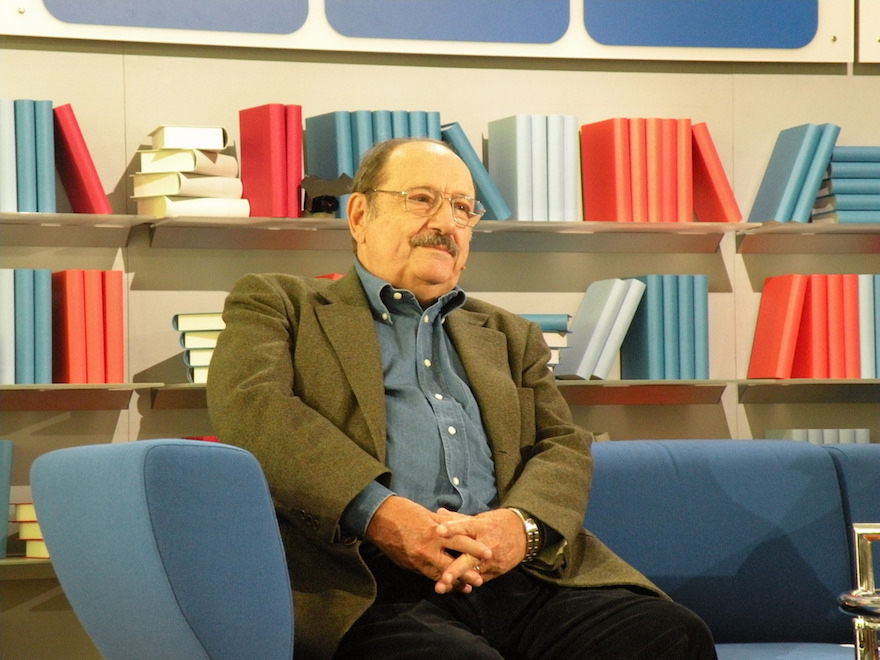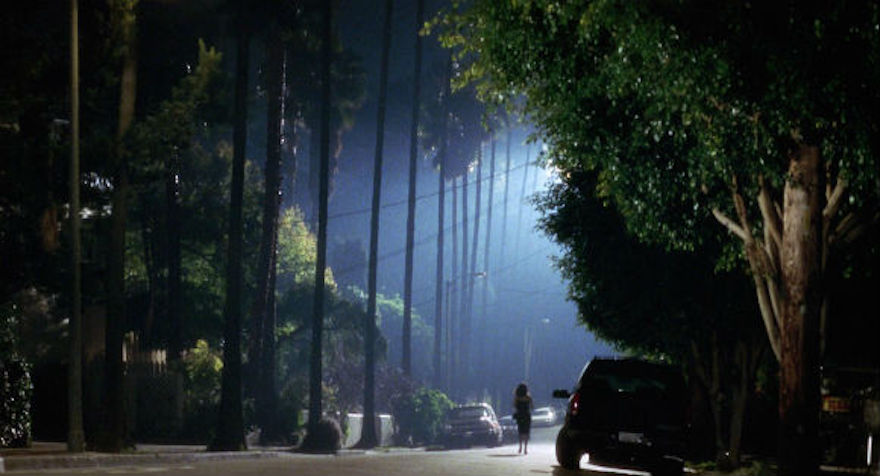At the very end of his playful Postscript to The Name of the Rose (1980), Umberto Eco made a casually sibylline gesture toward the future of interactive fiction. “It seems,” Eco wrote, “that the Parisian Oulipo group has recently constructed a matrix of all possible murder-story situations and has found that there is still to be written a book in which the murderer is the reader.” And a few lines later, with a wink: “Any true detection should reveal that we are the guilty party.” The text either ends or begins here, depending on your interpretation.
OuLiPo (Ouvroir de Littérature Potentielle) was a collective of experimental French writers and mathematicians who, in the 1960s, developed a new form of “potential literature,” where the imposition of arbitrary rules became a constitutive part of the work’s meaning. George Perec’s La Disparition (1969), for example, was a 300-page novel written without the letter “e.” The characters in the novel search for the missing letter, but can’t actually use it for fear of fatally injuring themselves. Meanwhile, Raymond Queneau’s A Hundred Thousand Billion Poems (1961) offered just that: 10 sonnets printed on separable lines of text that could be individually turned at will, producing 100,000,000,000,000 different poems for the reader’s pleasure. In adapting the aleatory (or chance-based) methods of composers like John Cage to the more nebulous domain of literary meaning, writers like Queneau updated the classical conventions of literature for a civilization riven by the conflict between freedom and order in unprecedented ways.

Although much of his work as a philosopher was devoted to explaining how such experiments were linguistically possible, Eco never set these constraints on his own fiction. Instead, he played other kinds of games. In his 1988 novel Foucault’s Pendulum, Eco had three men feed an unwieldy amount of esoteric trivia—involving Templars, Rosicrucians, Freemasons, Illuminati, and a thousand other occult sects—into a computer that synthesizes them at random to generate a master “Plan” explaining the course of European history. Tension rises as, over time, the three start to believe in their own Plan. Reality and fiction bleed together: “the game,” he writes, “was no longer a game.” Tragic consequences ensue, but it seems that the moral of the story didn’t stick: Eco would joke a few decades later that one of the uncredited characters in Foucault’s Pendulum was The Da Vinci Code (2003) author Dan Brown.
The Name of the Rose was built around a similar twist of interpretation. A monk detective hypothesizes that a series of unconnected murders in an abbey are being inspired by the events of the Seven Days of Revelation. But when he voices this erroneous theory, another monk is inspired to see the pattern through to its bloody end. This marks a common theme in both Eco’s fiction and his philosophical work: our interpretations of the world are necessary tools for making sense of it, but fixing onto these beliefs as if they revealed the true nature of things can be dangerous. The world is always more chaotic than the order our closed systems of signs impose.
From this angle, the playfulness of Eco’s fiction served a serious purpose. The author was notorious for stuffing his novels with an endless series of digressions, side quests, ephemera, arcane debates, and insane lists of every variety. (Eco once wrote that “we like lists because we don’t want to die.”) But in offering so many points of potential diversion and avenues of further learning for the curious reader, Eco, who grew up under the shadow of Mussolini, was waging as fierce a battle for artistic and intellectual liberty as the most radical of the French avant-gardists. Without sacrificing his natural gift for telling a great story, he ensured that his own text remained an open work, thereby preserving a space of possibility for an open world.
///
When Eco died from cancer in February, it felt like a grim period on the printed word’s death sentence. It is almost impossible to imagine a novel like The Name of the Rose selling 50 million copies in 2016. True, its appeal has been enduring enough over the years to inspire two Spanish videogames, a board game, and the curious idea that Christian Slater could pass as a German monk. But Eco never sanctioned any of these. He always insisted on the autonomy of literature, even as he was helping to change the idea of what literature could be. And it is doubtful that his fiction had the same kind of influence on the aesthetics of games that Philip K. Dick or William Gibson’s arguably did.
But in his work as a philosopher and cultural critic, Eco helped to create a world where feeding coded information into a user-controlled computer could produce something like art. Decades before his ascent to literary fame, he insisted on the necessity of breaking down the distinction between “high” and “low” culture, treating both as equally significant objects of analysis. Thus one might find, in any given essay, allusions to Thomas Aquinas, Ferdinand de Saussure, and Bach stacked up against intricate meditations on Disneyland and James Bond. This kind of polymathy was not just an opportunity for Eco to show off his unmatched erudition; it was a natural development of his theoretical conviction that, since all meaning arises from the interaction between structures of symbols, the true distinction between high and low culture is dictated by taste, not form.

Eco’s work in semiotics—a field he didn’t invent, but which he had largely sustained since the 1980s—was devoted to classifying and evaluating the forms of these symbolic structures. This work could be as dauntingly technical as that of any of the Medieval thinkers Eco loved, but the core idea is simple. Think of language: On their own, the 26 letters of the alphabet are just empty shapes with no meaning. But when we combine them into larger structures (words and sentences) according to fixed rules (of grammar), we end up with meaningful speech and successful communication. Semiotics takes this basic picture and applies it to everything in the human world—soccer matches, marriage customs, advertising. The world is an unfinished text waiting to be interpreted.
The revolutionary effect of combining these ideas is that the creation of artistic meaning becomes as natural to human beings as the ability to use language. As Cage and Queneau already intuited, we no longer need restrict ourselves to the classic aesthetic scenario of a God-like author imparting profound meanings through knowledge and techniques available only to her. We have, instead, the possibility of a democratic artwork where spectators become participants. A work where you can be the murderer and the detective.
It would be hard to overstate the importance of this shift for the development of open-world videogames. Whether the signs in question are pixelated manticores and ogres or the skyscrapers of a post-apocalyptic Boston, what distinguishes these games is that they allow for a recursive determination of the game’s own structures by the player. (Note that I am not distinguishing here between open world and “sandbox” games.) Every game necessarily gives the player some element of choice, even if it is only “Push A to proceed.” But open games give us choices about what kinds of choices we can make—they don’t give us a world of possibilities, they give us millions of possible worlds. The enjoyment doesn’t come from the number of options, but from seeing one’s authorial identity become manifest in a creation that remains larger than oneself.
Of course, not every collaboration is going to produce a great story. If one believes, as Eco did, that it should still be possible to distinguish “trash” from true art within interactive fiction, how do we know the difference? We can tease an answer out of Eco’s distinction between code and labyrinth. A code, in Eco’s sense, is the set of conventions that make it possible for a sender’s message to be understood by the receiver in an act of communication. My writing this paragraph presumes that you can read English, that you can operate a computer, and so on. Codes set a particular context for exchanges of information, eliminating ambiguity. Labyrinths, by contrast, are situations of irreducible ambiguity that arise from violations of convention. Codes make us stop at red lights and allow us to tell the time. Mulholland Drive (2001) beckons us into a labyrinth. Eco’s conviction is that art should actively struggle to defer and delay conventional meaning-fulfillments in order to restore our sense of the essential strangeness of the world.

A still from David Lynch’s Mulholland Drive
The ambiguity of open-world games is typically not, however, a symbolic one. Instead, it’s what can only be called an ontological ambiguity: which history will transpire? What virtual events will be actualized? Which soldiers will take an arrow in the knee? As you create your world, one omnipotent decree at a time, signs in that world begin to take on their own meaning as a part of the larger whole. But actually doing this involves navigating an endless series of deferrals and delays. As you progressively assemble your own labyrinth, where every point is connected to every other point, you create so many interlinked zones of expression to give the programmed codes a context.
Fans of open-world games already know that getting sidetracked is the point. But the best of these games, perhaps, are those where the secondary quests are as meaningful as the main plot, and where all of the different threads of the story can be woven together to form what Eco called “controlled disorder,” or an “organic fusion of multiple elements.” The success of The Witcher 3 last year seems largely attributable to its achievement of this precarious balance. This may have something to do with the game’s novelistic origins, but the real credit goes to the creators. Chris Breault put it well in his review for Kill Screen last year: “In almost every side-quest and monster-hunting contract you undertake, there are telltale signs of someone at CD Projekt Red actually giving a shit.”
In this light, perhaps we shouldn’t be too quick to celebrate the vaunted death of the author. It may be true that the modern work should be open, but to be art, it still needs the artists on the other side of the screen. And we need artists because our stories aren’t always our own. If they were, we would outlive their telling.
This seems to be what Eco wanted to convey when, in a 2003 talk on “The Future of Books,” he touched on the possibilities opened up by new forms of narrative media. This address seems endearingly outdated now, both for its dial-up era dialect and perhaps naive belief in the persistence of printed fiction. But with its playfully irreverent mashup of classic literary heavyweights and modern short-order entertainment, it is classic Eco. As a summation of the stakes of interactive fiction, it is perfect. And as an unwitting epitaph for this most bookish of authors, it is unexpectedly moving:
If you had War and Peace on a hypertextual and interactive CD-ROM, you could rewrite your own story according to your desires; you could invent innumerable War and Peaces, where Pierre Besuchov succeeds in killing Napoleon, or, according to your penchants, Napoleon definitely defeats General Kutusov. What freedom, what excitement! Every Bouvard or Pécuchet could become a Flaubert!
Alas, with an already written book, whose fate is determined by repressive, authorial decision, we cannot do this. We are obliged to accept fate and to realize that we are unable to change destiny. A hypertextual and interactive novel allows us to practice freedom and creativity, and I hope that such inventive activity will be implemented in the schools of the future. However, the already and definitely written novel War and Peace does not confront us with the unlimited possibilities of our imagination, but with the severe laws governing life and death.
